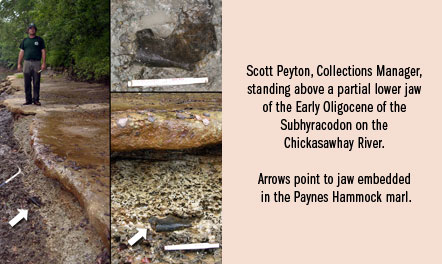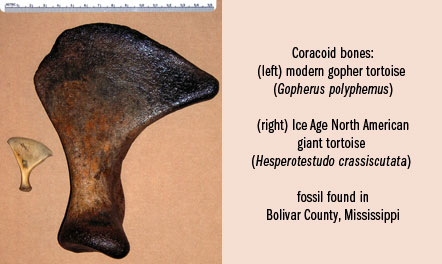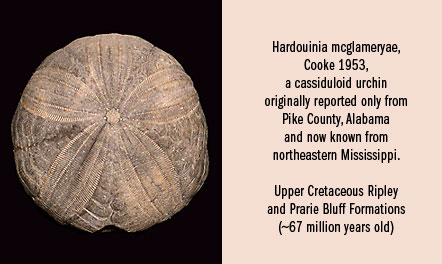Paleontology
MMNS Paleontology Collection
The primary mission of the MMNS Paleontology Collection is to both house and document the spatiotemporal spectrum of prehistoric animal and plant diversity within the state and to make this information available for educational and research purposes. The Paleontology Collection at MMNS, and its supportive Comparative Osteology Collection, is thus the principal resource for Mississippi citizens in need of identifying fossils as well as the bones of modern animals. MMNS Paleontology provides a centralized institution for in-state and out-of-state scientists studying Mississippi's natural history through its fossil diversity and prehistory.

Contact George Phillips
The Museum of Natural Science (MMNS) is the official state repository for Mississippi's fossil resources-both specimens and data. Historically, the U.S. National Museum (USNM) has been the central repository for fossils (and biological specimens) found throughout the United States. As USNM staff and funding has not grown to adequately accommodate the collection and resource needs required by researchers throughout the country, in-state natural history collections are needed to meet the needs of educators and researchers in each state. The MMNS fossil collection also increases the accessibility of Mississippi fossil resources to Mississippians-from schoolchildren to research scientists.

Collection Facts
- Total Assigned Catalogue Numbers: 10,000
- Total Number Catalogued Specimens: 30,000
- Number Mississippi Counties Represented: 52 of 82
- Type Specimens Owned by MMNS:
-
- MMNS VP-445 Cynthiacetus maxwelli Uhen 2005, holotype of a Late Eocene archaeocete whale from Mississippi
- MMNS IP-37 Hardouinia saucierae Phillips et al., holotype of a Late Cretaceous cassiduloid urchin from Mississippi
- MMNS IP-1043 Lefortia rozmorganae sp.nov. (in prep.), holotype of a Late Cretaceous cassiduloid urchin from Arkansas
- MMNS IP-1245 Hardouinia bowlesi sp. nov. (in prep.), holotype
- MMNS IP-576 Hardouinia haysi sp. nov. (in prep.), holotype of a Late Cretaceous cassiduloid urchin from Mississippi
- Famous holotypes from Mississippi (cast copies held/displayed at MMNS):
-
- ANSP 12546 Panthera atrox (Leidy 1853), left lower jaw of an American lion from the Pleistocene of Natchez, Miss. (Philadelphia Academy of Natural Sciences)
- USNM V16646 Notiotitanops mississippiensis Gazin & Sullivan 1942, skull & lower jaw of a brontothere from the Middle Eocene of Quitman, Miss. (Smithsonian - National Museum of Natural History)
- Several early mammals from the latest Paleocene or earliest Eocene greensand at the Red Hot Truck Stop, Meridian, Miss. (Carnegie Museum of Natural History)

Mississippi Fossil Facts
- State Fossil: Zygorhiza kochii (Reichenbach 1847), a small Late Eocene archaeocete whale. The state of Mississippi is so rich in whale fossils it has been said to lie in the "fossil whale belt" of the Southeast.
- State Stone: Petrified wood. Visit the Mississippi Petrified Forest!
Paleontology Volunteers
- Peter Kuchirka, Volunteer Preparator
- Joy Rushing, Volunteer Technician
- Rosanne Horne, Volunteer Technician
Associate Researchers
- Chuck Ciampaglio, Wright State University, Celina, Ohio
- David T. Dockery, Mississippi Office of Geology, Jackson, Mississippi
- James Lamb, McWane Science Center, Birmingham, Alabama
- Earl Manning, Davenport, Iowa
- James E. Starnes, Mississippi Office of Geology, Jackson, Mississippi

Links of Interest
Fossils in the MMNS Paleontology Collection are described and imaged at the following:
Out-of-State Museums with Mississippi fossil holdings:
- Alabama Museum of Natural History
- American Museum of Natural History
- Florida Museum of Natural History
- National Museum of Natural History-Smithsonian
- Philadelphia Academy of Natural Sciences
- University of California Museum of Paleontology
- University of Kansas Museum of Natural History
- Yale Peabody Museum of Natural History



